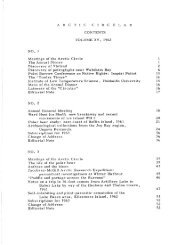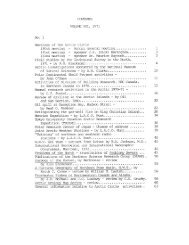Vol.. XX 'flilr AIiCTIC (IInCULARi\'lr. Rcrtqrcl sitoi\'cd lv i th ccl lour.' s l i clc's tirat btr lldozcr.tt'ltiIs tlrrouglr tlrr: tunclra lviII rc-vegcttrtc, itnd citn cvcn lre:;cctlctl rvitlr Iirilsscs. [)r. (1. llrrrris, a I icht:n sirccilrList intlrt' ;rueli cnrtc, f ront I'ici,4;rstcr IJn ivc'rs i t\/, rtotetl th;rt clrt trai I siitit)/ rl()nL'tltc lcrss ucrs i st as t'sca rs'r or) thc. ttrnrll;r 1'or l-rerhatlslrui)clrcd:; clf ycal"s, cvcn i f rc-vc:lcti-rtecl .i)r. 'fom illise, Assistant l)ire:ct.or, Nortirc.rn I:cononic:i)cvc I oillirc-'nt Ilranch, l)cpartment of I ncl"i an Af f ai r"s ancl Nortlicrni)c-'vt: lopntcitt, spoke for thc govcrnnrr-'nt t s 1-ole in ellcouf aginglurt:tic rlcvcloirmcnt. IIc strcssccl that govc'rnnrcnt is intcrestedI'to1'rtnlv irt nrt-rmotingi developtrtent in thc <strong>Arctic</strong>, irrrt also ini)r'ose'rving tlrt: Nortir, lind that !'l,ovcrnnrcnt poli ci c.s itrecvolr-rt ionlrnr r"athcr tilur static. ilc said lris De.i;altnrent oohii-'{tcor.i}i zc's i'i rrc di {'{'crent devclo|nent zoncs in tirc '1'c-rri tori es,crtcir o1: lviriclr j)r'csc'nts ir di f{'crent c:onrtlina.tion o{' trroblenrs, anclt,irrrt iris o{'ficers hrcrc not only tr;'inri t.o drrft land-userclirllt!cns in co-operation rvjth lroth industria1 rclrrescntatirrcslncl r:on:icrv:rt.ioni-sts, l;rrt r.{crc planni-ng sinrilar' ttseir"-rrsettr-cllui lt ions, and i ntenclctl to nrclnitor indr-rstri lL1 operations, nndi {- t-tccess it r/ t o ilrosccute o f fr-:ndcrs . ilc 1{i:ls hot 1y atrd scel-.ti ca I 1v(itlcst i otrcci i,\t tirc l;trtli CnCe aS to r,vltctlter dcvel ollnent ir'oul I l'rctlcla,r,ctl untiI tircse rcgulntions anci their ert'l'orcernent hrere inoilcrirt ion, :rnd rr'lietircr tiie rule s would lle retroacti vc.Ilr. l{ i sc provoked slrarl; rc.icii nders {'rom the u.ucli L-nc-cf-or' .J i r,'!,r-i such irs : ( I ) conscrv:rtion rvork sitoulcl be concentratcd'i n ir(,r'c 1)opul ou:; uarts o{: Canada, rvliere 1:o11ut i on i s lvorst,(2) !ic lrrve a rcspons i li i 1i t1' to fostcr clevclo;rnicnt througirotrtthc r,,,orlcl, to irnprovc thc 1ivcs of rapidiv increr-sing iropulations,(3) tourisnr jn thc <strong>Arctic</strong> is I'casible only if tl-lcre is ani rrclu-., t ri :r 1 lra-sc tircre , (4) pol luti on of the rrcti c scas i s o1jI i tt 1c consc"(iLrcncL-', ls thcre arc fclt' ilcoir lg l ivl ng on the arcti cshore:;, ancl (5) tire' poor record of industr),, as a r,iirole, i nirilinri rrltirrc rrcopic nrust bc secn i.n pcrslrectjr,'c: After lil,tlrr.'rt;rtir;c ircoplc comllr:isc n snra1l proportion of thc CanadianJroi")ulrttir,rn. '['irc'rc rrc no douht I]ros antl cons to a1l thescconccpt:;, but u;r iortunntcl y' onc cvcni ng h'ls far fron sui.fic:ienttirlc 1-or trn udccluatc rliscussion.Dr. ,Joiirr i,rnrircrt, Iiiology l)cpartrncnt, CarletonIjrrivcrsit;y', spolie of thc tlclicat(-' balance o{' li f'c in nortirelncL-oslrstcns, lrcl'lt' cusi 1)' cntirc 1i {'c systeills can irc dist'upted,Irrtd hoiv l ong thcy trrkc to recovc'r. IIc renrj nclecl us that rvc- lvi i igct rlc) scconcl, third, or fourtlr chance in tirr-' <strong>Arctic</strong> as r4rc doin r]lore southcrn lati turlcs; tirut unfortunate 1),, industry ancl
VOL. XX TIIE ARCTIC CI RCULARgovernment are moving at fantastic rates to exploit and controlarctic resources; and that we have little biological data bywhich to judge consequent environmental change. hte are 10 yearsbehind industry in our research, and there is no time to closethe gap. IIis remarks were echoed by many members of the audience,and several speakers said that the government should declare amoratorium for several years, until we haver the necessary data.Dr. l,antbert said that most conservationists were notasking that there be a complete ban on development, but only thatthcre should bc good land-use regulations, nore precautionstaken on operations in tire field, and clear el'idence that thegovernment is readl' and able to rnonitor and enforce itsregulations. One might ask, for example, "i.s the governrnentready to spend $2,000.00 to check on a single offshore drillingrig if it becomes necessorlztf , or "is the governrnent ready todestroy and burn a nulti-million dollar ship if it seems aboutto break up and nollute the sea hiith oil?". He showed thatcanada has had its 'tdisastersff already this past year with awell at Drake Point blowing gas and salt water freetry into theenvironment, and Dossibly other uncapped wells elsewhere, andthat only by good fortune have rve so far been spared a majoroil spillage. One wonders if lve are any better prepared todaythan Britain was itefore the wreck of the Torre), Canyon, orCalifornia was ttcfore the Santa Barbara disaster.Bioloqists are suspicious, &fl ecologist in the audiencedeclared. Too often conservationists have seen multiple-useplans result in multiple-abuse, and repeatedly the question wasasked: Ilow soon wi 11 land-use regulations be in force?Dr. Lambert concurred with these remarks, and he asked whatmotivated industry to seek and government to encouragedevelopment, when Alberta oi1 rvells today have their capacitycurtailed to 34eo of capacity because of limited markets.In summary, Dr. Chas. Jonk.el, Chairman of the Synposi-un,reminded the audience and the panel that there are manydefinitions of ffprogressrf . An area with few people, cleanwater, and clean air has what the whole world wants; progressin such areas just might mean maintaining the status- quo.Furthermore, he said, organisms in the <strong>Arctic</strong> still live inconditions most similar to those under rvhich they evolved, andarctic areas may provide us with our last chance to discoverimportant new principles of ecology, genetics, and evolution.
- Page 1 and 2: ldo. ICONIENISvoLWE )C(, 1970lbetin
- Page 3 and 4: THE ARCTICCIRCULARVOL. XX No, IPubl
- Page 5: VOL" XX THE ARCTIC CIRCULARThe Trea
- Page 9 and 10: VOL . XX T}lE ARCTI C CI RCULARin f
- Page 11 and 12: VOL. XX TIIE ARCTIC CIRCULARS.Ts. G
- Page 13 and 14: VOL. XX TLIE AITCTIC CIRCUI,ARIITra
- Page 15 and 16: VOL. XX TTIE ARCTIC CIRCULARl3were
- Page 17 and 18: VOL. XX T}IE ARCTIC CIRCULARt5llive
- Page 19 and 20: VOL. XX TIIII .\RCTIC CIRCULARL7arc
- Page 21 and 22: VOL. XX THE ARCTIC CIRCULAR193) Rem
- Page 23 and 24: THE AIICTlO UIRCULAR.Volume XX No.
- Page 25 and 26: 23Firrcou]-irqinq 1,i e oil. l-rcon
- Page 27 and 28: ,AA partial lncratoriull vrc,ukl re
- Page 29 and 30: 27'l'ltc 'i'errit,,-'rf lii':idnrin
- Page 31 and 32: frr adclitiot,, a slilii LI p,i r"C
- Page 33 and 34: 3LrestorintT j tsreturninq tlieItb.
- Page 35 and 36: 33l+5 fecf lonri by 16 feet wicle.
- Page 37 and 38: 35post,s hr,,d been set, in a fairl
- Page 39 and 40: 2r7)t1l'; T'iif;l Al' TAnCT"l C .;:
- Page 41 and 42: )9-litt,erl out, rni:r Lh spr:ciai
- Page 43 and 44: 4rrendniscent of a froelodyte city,
- Page 45 and 46: JrFiniot e sl,aLi-ons vrltich do+-.
- Page 47 and 48: L5ci.ist,ur;bar'rce, and s;he soorr
- Page 49 and 50: 7of th,er fenlales to elicj-t sexua
- Page 51 and 52: .t i,q/'i'i'.]'ll'j'i'Y-Si;,COI'iD
- Page 53 and 54: TiiE A}TCTIC OIil,CUi,AITV0L. XX No
- Page 55 and 56: vOL. xx I'JO . 3T'liE AiiCTIC 0iiiC
- Page 57 and 58:
vOL. XX ln0. 3 Tiilt i.ilcTT0 rjrli
- Page 59 and 60:
V0L. ,vJ{ j{0. 3 TIIIi AhOTiC Ollt0
- Page 61 and 62:
Vt-. L . /'I:il {Tr itt ;l-)!'i,ii.
- Page 63 and 64:
VL'L. XX r{U" } Tiill l!}L(.rTIU L,
- Page 65 and 66:
Yr.-,L. XX ,\f,). 3 i';i;:, iirtuTi
- Page 67 and 68:
,rL/ rolri ncrcase in i,itc:it;rs l
- Page 69 and 70:
VOL. XX I\iO. 3 T HE Ati0Ti0 Clli0t
- Page 71 and 72:
VOL. XX i\iu. 3 truj AiiCTi0 LlIiiC
- Page 73 and 74:
Conservation of arctic, 4*5Ccnk, F.
- Page 75 and 76:
I.lrrris, D.K., 14ldonsuch, S. S. ,












